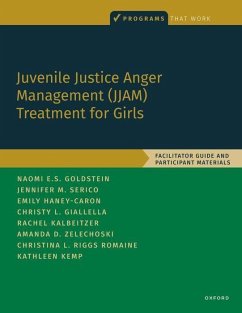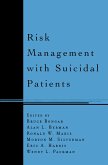Naomi E Goldstein, Jennifer Serico, Emily Haney-Caron, Christy Giallella, Rachel Kalbeitzer, Amanda D Zelechoski, Christina L Riggs Romaine, Kathleen Kemp
Juvenile Justice Anger Management (Jjam) Treatment for Girls
Facilitator Guide and Participant Materials
Naomi E Goldstein, Jennifer Serico, Emily Haney-Caron, Christy Giallella, Rachel Kalbeitzer, Amanda D Zelechoski, Christina L Riggs Romaine, Kathleen Kemp
Juvenile Justice Anger Management (Jjam) Treatment for Girls
Facilitator Guide and Participant Materials
- Broschiertes Buch
- Merkliste
- Auf die Merkliste
- Bewerten Bewerten
- Teilen
- Produkt teilen
- Produkterinnerung
- Produkterinnerung
The Juvenile Justice Anger Management (JJAM) Treatment for Girls is a manualized anger management and aggression reduction treatment designed for adolescent girls and young women placed in residential juvenile justice facilities. This gender-specific treatment is an 8-week, cognitive-behavioral group intervention that consists of 16 90-minute sessions. The JJAM Facilitator Manual includes a user-friendly, session-by-session guide, along with the accompanying workbook materials for youth participants.
Andere Kunden interessierten sich auch für
![The Anger Makeover The Anger Makeover]() Walter J PoltThe Anger Makeover23,99 €
Walter J PoltThe Anger Makeover23,99 €![Art Therapy and Anger Art Therapy and Anger]() Art Therapy and Anger55,99 €
Art Therapy and Anger55,99 €![Familiarity and Conviction in the Criminal Justice System Familiarity and Conviction in the Criminal Justice System]() Joanna PozzuloFamiliarity and Conviction in the Criminal Justice System71,99 €
Joanna PozzuloFamiliarity and Conviction in the Criminal Justice System71,99 €![Risk Management with Suicidal Patients Risk Management with Suicidal Patients]() Alan Berman / Bruce Bongar / Wendy Packman (eds.)Risk Management with Suicidal Patients34,99 €
Alan Berman / Bruce Bongar / Wendy Packman (eds.)Risk Management with Suicidal Patients34,99 €![Anger Management Anger Management]() Rhonda SwanAnger Management14,99 €
Rhonda SwanAnger Management14,99 €![Gender, Psychology, and Justice Gender, Psychology, and Justice]() Gender, Psychology, and Justice43,99 €
Gender, Psychology, and Justice43,99 €![Oxford Guide to the Treatment of Mental Contamination Oxford Guide to the Treatment of Mental Contamination]() Stanley RachmanOxford Guide to the Treatment of Mental Contamination86,99 €
Stanley RachmanOxford Guide to the Treatment of Mental Contamination86,99 €-
-
-
The Juvenile Justice Anger Management (JJAM) Treatment for Girls is a manualized anger management and aggression reduction treatment designed for adolescent girls and young women placed in residential juvenile justice facilities. This gender-specific treatment is an 8-week, cognitive-behavioral group intervention that consists of 16 90-minute sessions. The JJAM Facilitator Manual includes a user-friendly, session-by-session guide, along with the accompanying workbook materials for youth participants.
Hinweis: Dieser Artikel kann nur an eine deutsche Lieferadresse ausgeliefert werden.
Hinweis: Dieser Artikel kann nur an eine deutsche Lieferadresse ausgeliefert werden.
Produktdetails
- Produktdetails
- Verlag: Hurst & Co.
- Seitenzahl: 632
- Erscheinungstermin: 30. Mai 2023
- Englisch
- Abmessung: 280mm x 216mm x 36mm
- Gewicht: 1352g
- ISBN-13: 9780197609286
- ISBN-10: 0197609287
- Artikelnr.: 66999052
- Herstellerkennzeichnung
- Libri GmbH
- Europaallee 1
- 36244 Bad Hersfeld
- gpsr@libri.de
- Verlag: Hurst & Co.
- Seitenzahl: 632
- Erscheinungstermin: 30. Mai 2023
- Englisch
- Abmessung: 280mm x 216mm x 36mm
- Gewicht: 1352g
- ISBN-13: 9780197609286
- ISBN-10: 0197609287
- Artikelnr.: 66999052
- Herstellerkennzeichnung
- Libri GmbH
- Europaallee 1
- 36244 Bad Hersfeld
- gpsr@libri.de
Naomi E. S. Goldstein, Ph.D., is Professor of Psychology, Co-Director of the JD/PhD Program in Law and Psychology, and Director of the Juvenile Justice Research and Reform Lab at Drexel University. For more than 20 years, Dr. Goldstein has collaborated with community stakeholders to use social science research to improve juvenile justice policy and practice. She uses research to guide large-scale system change, leads implementation projects to promote high-quality dissemination of juvenile justice reforms, and evaluates the effects of new programs and policies on youth and communities. She also provides training and technical assistance to juvenile justice practitioners to help agencies develop and implement new policies and practices to improve outcomes for youth and communities. Jennifer M. Serico, Ph.D., is a clinical psychologist specializing child and adolescent trauma. Dr. Serico completed her doctoral degree in clinical psychology at Drexel University. Following her graduate work with justice-involved youth, she sought training opportunities in trauma-focused prevention and intervention. She has been implementing evidence-based treatments (e.g., PCIT, TF-CBT and DBT) for families who have experienced trauma at the Center for Child and Family Traumatic Stress at Kennedy Krieger Institute since 2013. Dr. Serico currently provides education, training, and supervision, and conducts research focused on complex trauma and emotional dysregulation in her role at KKI and Johns Hopkins. Emily Haney-Caron, J.D., Ph.D., is an Assistant Professor of Psychology and Director of the Youth Law & Psychology Lab at John Jay College of Criminal Justice. She holds a law degree and a doctorate in Clinical Psychology from Drexel University, and she completed a pre-doctoral clinical internship at Brown University Warren Alpert Medical School. Her research, scholarship, policy work, and teaching are all focused on the juvenile legal system, with a primary goal of contributing to system reform to increase racial justice and improve the system's developmental appropriateness. Dr. Haney-Caron is a licensed attorney in Pennsylvania and a licensed psychologist in New York. Christy Giallella, Ph.D., is Clinical Forensic Manager with the Philadelphia Department of Behavioral Health and Intellectual Disability Services. Dr. Giallella manages programs for justice-involved individuals with behavioral health challenges, including initiatives with the jail, state hospital, state prisons, and probation and parole. Dr. Giallella earned her doctorate in Clinical Psychology from Drexel University and BA in Psychology from Georgetown University. She is a licensed clinical psychologist with a specialization in forensic psychology. Dr. Giallella has worked in numerous community-based and correctional settings with justice-involved adolescents and adults. Her research background includes juvenile justice, forensic mental health assessment, and public policy. Rachel Kalbeitzer, Ph.D., is a licensed clinical and forensic psychologist specializing in the assessment of juveniles and adults involved in the criminal justice system. She earned a doctoral degree in Clinical Psychology with a Forensic Concentration from Drexel University. She completed a postdoctoral fellowship in Forensic Psychology through the University of Massachusetts Law and Psychiatry Program. She has provided forensic evaluation services in juvenile and adult court clinics, prisons, and psychiatric hospitals. She currently works for the Department of Defense and has a private forensic practice conducting criminal forensic evaluations. Her research interests focus on juvenile justice issues and adjudicative competence. Amanda Zelechoski, J.D., Ph.D., is a licensed clinical and forensic psychologist and attorney, specializing in trauma. She is board certified in Clinical Child and Adolescent Psychology and has worked clinically with adults, children, and families. She is a Professor of Psychology and Director of Clinical Training at Purdue University Northwest. Dr. Zelechoski's research examines the intersection between psychology, law, and trauma, particularly for underserved and vulnerable populations. Kathleen Kemp, Ph.D., is an Assistant Professor (Research) at the Brown University Warren Alpert Medical School and Director of the Rhode Island Family Court Mental Health Clinic, where she specializes in forensic mental health evaluations with adolescents. She earned her doctoral degree at Drexel University and completed her forensic psychology fellowship at the University of Virginia's Institute of Law, Psychiatry, and Public Policy and Western State Hospital. Her NIMH-funded clinical research focuses on suicide prevention as well as the dissemination and implementation of evidence-based practice with juvenile justice involved-youth. Christina L. Riggs Romaine, Ph.D., received her doctorate in Clinical Psychology with a concentration in Forensic Psychology at Drexel University and completed a post-doctoral fellowship in Forensic Psychology at the University of Massachusetts Medical School in collaboration with the Department of Youth Services. She has worked as an evaluator and service provider in pre- and post-adjudication facilities, and as a forensic evaluator in the MA Juvenile Court Clinics. She is now an Associate Professor of Psychology at Wheaton College where she conducts research on juvenile adjudicative competence, risk, and developmental maturity.
* Part 1- Facilitator guide and materials
* INTRODUCTION FOR FACILITATORS
* 1.1 Facilitator Guide
* SESSION 1: IS ANGER NORMAL?
* SESSION 2: CONSEQUENCES OF ANGER AND THE IMPORTANCE OF SETTING GOALS
* SESSION 3: INTRODUCTION TO SOCIAL AGGRESSION
* SESSION 4: DOES EVERYONE SEE THE SAME THING?
* SESSION 5: RECOGNITION OF ANGER
* SESSION 6: TRIGGERS OF ANGER
* SESSION 7: SELF-CONTROL
* SESSION 8: HOW DO I KEEP MYSELF CALM?
* SESSION 9: HOW DO I STOP MYSELF WHEN I'M ANGRY?
* SESSION 10: COMMUNICATION
* SESSION 11: INTRODUCTION TO PROBLEM SOLVING
* SESSION 12: IDENTIFYING OPTIONS AND CONSEQUENCES
* SESSION 13: REPAIRING DAMAGED RELATIONSHIPS
* SESSION 14: PREPARING FOR OUR FUTURES
* SESSION 15: CAN I BE A STAR?
* SESSION 16: DRESS REHEARSAL AND PLAY
* 1.2 Facilitator Materials
* FACILITATOR MATERIALS FOR ALL SESSIONS
* SESSION 1 FACILITATOR MATERIALS: IS ANGER NORMAL?
* SESSION 2 FACILITATOR MATERIALS: CONSEQUENCES OF ANGER AND THE
IMPORTANCE OF SETTING GOALS
* SESSION 3 FACILITATOR MATERIALS: INTRODUCTION TO SOCIAL AGGRESSION
* SESSION 4 FACILITATOR MATERIALS: DOES EVERYONE SEE THE SAME THING?
* SESSION 5 FACILITATOR MATERIALS: RECOGNITION OF ANGER
* SESSION 6 FACILITATOR MATERIALS: TRIGGERS OF ANGER
* SESSION 7 FACILITATOR MATERIALS: SELF-CONTROL
* SESSION 8 FACILITATOR MATERIALS: HOW DO I KEEP MYSELF CALM?
* SESSION 9: FACILITATOR MATERIALS HOW DO I STOP MYSELF WHEN I'M ANGRY?
* SESSION 10 FACILITATOR MATERIALS: COMMUNICATION
* SESSION 11 FACILITATOR MATERIALS: INTRODUCTION TO PROBLEM SOLVING
* SESSION 12 FACILITATOR MATERIALS: IDENTIFYING OPTIONS AND
CONSEQUENCES
* SESSION 13 FACILITATOR MATERIALS: REPAIRING DAMAGED RELATIONSHIPS
* SESSION 14 FACILITATOR MATERIALS: PREPARING FOR OUR FUTURES
* SESSION 15 FACILITATOR MATERIALS: CAN I BE A STAR?
* Part 2- Participant Materials
* SESSION 1 PARTICIPANT MATERIALS: IS ANGER NORMAL?
* SESSION 2 PARTICIPANT MATERIALS: CONSEQUENCES OF ANGER AND THE
IMPORTANCE OF SETTING GOALS
* SESSION 3 PARTICIPANT MATERIALS: INTRODUCTION TO SOCIAL AGGRESSION
* SESSION 4 PARTICIPANT MATERIALS: DOES EVERYONE SEE THE SAME THING?
* SESSION 5 PARTICIPANT MATERIALS: RECOGNITION OF ANGER
* SESSION 6: PARTICIPANT MATERIALS TRIGGERS OF ANGER
* SESSION 7 PARTICIPANT MATERIALS: SELF-CONTROL
* SESSION 8 PARTICIPANT MATERIALS: HOW DO I KEEP MYSELF CALM?
* SESSION 9 PARTICIPANT MATERIALS: HOW DO I STOP MYSELF WHEN I'M ANGRY?
* SESSION 10 PARTICIPANT MATERIALS: COMMUNICATION
* SESSION 11 PARTICIPANT MATERIALS: INTRODUCTION TO PROBLEM SOLVING
* SESSION 12 PARTICIPANT MATERIALS: IDENTIFYING OPTIONS AND
CONSEQUENCES
* SESSION 13 PARTICIPANT MATERIALS: REPAIRING DAMAGED RELATIONSHIPS
* SESSION 14: PARTICIPANT MATERIALS PREPARING FOR OUR FUTURES
* SESSION 15 PARTICIPANT MATERIALS: CAN I BE A STAR?
* SESSION 16 PARTICIPANT MATERIALS: DRESS REHEARSAL AND PLAY
* INTRODUCTION FOR FACILITATORS
* 1.1 Facilitator Guide
* SESSION 1: IS ANGER NORMAL?
* SESSION 2: CONSEQUENCES OF ANGER AND THE IMPORTANCE OF SETTING GOALS
* SESSION 3: INTRODUCTION TO SOCIAL AGGRESSION
* SESSION 4: DOES EVERYONE SEE THE SAME THING?
* SESSION 5: RECOGNITION OF ANGER
* SESSION 6: TRIGGERS OF ANGER
* SESSION 7: SELF-CONTROL
* SESSION 8: HOW DO I KEEP MYSELF CALM?
* SESSION 9: HOW DO I STOP MYSELF WHEN I'M ANGRY?
* SESSION 10: COMMUNICATION
* SESSION 11: INTRODUCTION TO PROBLEM SOLVING
* SESSION 12: IDENTIFYING OPTIONS AND CONSEQUENCES
* SESSION 13: REPAIRING DAMAGED RELATIONSHIPS
* SESSION 14: PREPARING FOR OUR FUTURES
* SESSION 15: CAN I BE A STAR?
* SESSION 16: DRESS REHEARSAL AND PLAY
* 1.2 Facilitator Materials
* FACILITATOR MATERIALS FOR ALL SESSIONS
* SESSION 1 FACILITATOR MATERIALS: IS ANGER NORMAL?
* SESSION 2 FACILITATOR MATERIALS: CONSEQUENCES OF ANGER AND THE
IMPORTANCE OF SETTING GOALS
* SESSION 3 FACILITATOR MATERIALS: INTRODUCTION TO SOCIAL AGGRESSION
* SESSION 4 FACILITATOR MATERIALS: DOES EVERYONE SEE THE SAME THING?
* SESSION 5 FACILITATOR MATERIALS: RECOGNITION OF ANGER
* SESSION 6 FACILITATOR MATERIALS: TRIGGERS OF ANGER
* SESSION 7 FACILITATOR MATERIALS: SELF-CONTROL
* SESSION 8 FACILITATOR MATERIALS: HOW DO I KEEP MYSELF CALM?
* SESSION 9: FACILITATOR MATERIALS HOW DO I STOP MYSELF WHEN I'M ANGRY?
* SESSION 10 FACILITATOR MATERIALS: COMMUNICATION
* SESSION 11 FACILITATOR MATERIALS: INTRODUCTION TO PROBLEM SOLVING
* SESSION 12 FACILITATOR MATERIALS: IDENTIFYING OPTIONS AND
CONSEQUENCES
* SESSION 13 FACILITATOR MATERIALS: REPAIRING DAMAGED RELATIONSHIPS
* SESSION 14 FACILITATOR MATERIALS: PREPARING FOR OUR FUTURES
* SESSION 15 FACILITATOR MATERIALS: CAN I BE A STAR?
* Part 2- Participant Materials
* SESSION 1 PARTICIPANT MATERIALS: IS ANGER NORMAL?
* SESSION 2 PARTICIPANT MATERIALS: CONSEQUENCES OF ANGER AND THE
IMPORTANCE OF SETTING GOALS
* SESSION 3 PARTICIPANT MATERIALS: INTRODUCTION TO SOCIAL AGGRESSION
* SESSION 4 PARTICIPANT MATERIALS: DOES EVERYONE SEE THE SAME THING?
* SESSION 5 PARTICIPANT MATERIALS: RECOGNITION OF ANGER
* SESSION 6: PARTICIPANT MATERIALS TRIGGERS OF ANGER
* SESSION 7 PARTICIPANT MATERIALS: SELF-CONTROL
* SESSION 8 PARTICIPANT MATERIALS: HOW DO I KEEP MYSELF CALM?
* SESSION 9 PARTICIPANT MATERIALS: HOW DO I STOP MYSELF WHEN I'M ANGRY?
* SESSION 10 PARTICIPANT MATERIALS: COMMUNICATION
* SESSION 11 PARTICIPANT MATERIALS: INTRODUCTION TO PROBLEM SOLVING
* SESSION 12 PARTICIPANT MATERIALS: IDENTIFYING OPTIONS AND
CONSEQUENCES
* SESSION 13 PARTICIPANT MATERIALS: REPAIRING DAMAGED RELATIONSHIPS
* SESSION 14: PARTICIPANT MATERIALS PREPARING FOR OUR FUTURES
* SESSION 15 PARTICIPANT MATERIALS: CAN I BE A STAR?
* SESSION 16 PARTICIPANT MATERIALS: DRESS REHEARSAL AND PLAY
* Part 1- Facilitator guide and materials
* INTRODUCTION FOR FACILITATORS
* 1.1 Facilitator Guide
* SESSION 1: IS ANGER NORMAL?
* SESSION 2: CONSEQUENCES OF ANGER AND THE IMPORTANCE OF SETTING GOALS
* SESSION 3: INTRODUCTION TO SOCIAL AGGRESSION
* SESSION 4: DOES EVERYONE SEE THE SAME THING?
* SESSION 5: RECOGNITION OF ANGER
* SESSION 6: TRIGGERS OF ANGER
* SESSION 7: SELF-CONTROL
* SESSION 8: HOW DO I KEEP MYSELF CALM?
* SESSION 9: HOW DO I STOP MYSELF WHEN I'M ANGRY?
* SESSION 10: COMMUNICATION
* SESSION 11: INTRODUCTION TO PROBLEM SOLVING
* SESSION 12: IDENTIFYING OPTIONS AND CONSEQUENCES
* SESSION 13: REPAIRING DAMAGED RELATIONSHIPS
* SESSION 14: PREPARING FOR OUR FUTURES
* SESSION 15: CAN I BE A STAR?
* SESSION 16: DRESS REHEARSAL AND PLAY
* 1.2 Facilitator Materials
* FACILITATOR MATERIALS FOR ALL SESSIONS
* SESSION 1 FACILITATOR MATERIALS: IS ANGER NORMAL?
* SESSION 2 FACILITATOR MATERIALS: CONSEQUENCES OF ANGER AND THE
IMPORTANCE OF SETTING GOALS
* SESSION 3 FACILITATOR MATERIALS: INTRODUCTION TO SOCIAL AGGRESSION
* SESSION 4 FACILITATOR MATERIALS: DOES EVERYONE SEE THE SAME THING?
* SESSION 5 FACILITATOR MATERIALS: RECOGNITION OF ANGER
* SESSION 6 FACILITATOR MATERIALS: TRIGGERS OF ANGER
* SESSION 7 FACILITATOR MATERIALS: SELF-CONTROL
* SESSION 8 FACILITATOR MATERIALS: HOW DO I KEEP MYSELF CALM?
* SESSION 9: FACILITATOR MATERIALS HOW DO I STOP MYSELF WHEN I'M ANGRY?
* SESSION 10 FACILITATOR MATERIALS: COMMUNICATION
* SESSION 11 FACILITATOR MATERIALS: INTRODUCTION TO PROBLEM SOLVING
* SESSION 12 FACILITATOR MATERIALS: IDENTIFYING OPTIONS AND
CONSEQUENCES
* SESSION 13 FACILITATOR MATERIALS: REPAIRING DAMAGED RELATIONSHIPS
* SESSION 14 FACILITATOR MATERIALS: PREPARING FOR OUR FUTURES
* SESSION 15 FACILITATOR MATERIALS: CAN I BE A STAR?
* Part 2- Participant Materials
* SESSION 1 PARTICIPANT MATERIALS: IS ANGER NORMAL?
* SESSION 2 PARTICIPANT MATERIALS: CONSEQUENCES OF ANGER AND THE
IMPORTANCE OF SETTING GOALS
* SESSION 3 PARTICIPANT MATERIALS: INTRODUCTION TO SOCIAL AGGRESSION
* SESSION 4 PARTICIPANT MATERIALS: DOES EVERYONE SEE THE SAME THING?
* SESSION 5 PARTICIPANT MATERIALS: RECOGNITION OF ANGER
* SESSION 6: PARTICIPANT MATERIALS TRIGGERS OF ANGER
* SESSION 7 PARTICIPANT MATERIALS: SELF-CONTROL
* SESSION 8 PARTICIPANT MATERIALS: HOW DO I KEEP MYSELF CALM?
* SESSION 9 PARTICIPANT MATERIALS: HOW DO I STOP MYSELF WHEN I'M ANGRY?
* SESSION 10 PARTICIPANT MATERIALS: COMMUNICATION
* SESSION 11 PARTICIPANT MATERIALS: INTRODUCTION TO PROBLEM SOLVING
* SESSION 12 PARTICIPANT MATERIALS: IDENTIFYING OPTIONS AND
CONSEQUENCES
* SESSION 13 PARTICIPANT MATERIALS: REPAIRING DAMAGED RELATIONSHIPS
* SESSION 14: PARTICIPANT MATERIALS PREPARING FOR OUR FUTURES
* SESSION 15 PARTICIPANT MATERIALS: CAN I BE A STAR?
* SESSION 16 PARTICIPANT MATERIALS: DRESS REHEARSAL AND PLAY
* INTRODUCTION FOR FACILITATORS
* 1.1 Facilitator Guide
* SESSION 1: IS ANGER NORMAL?
* SESSION 2: CONSEQUENCES OF ANGER AND THE IMPORTANCE OF SETTING GOALS
* SESSION 3: INTRODUCTION TO SOCIAL AGGRESSION
* SESSION 4: DOES EVERYONE SEE THE SAME THING?
* SESSION 5: RECOGNITION OF ANGER
* SESSION 6: TRIGGERS OF ANGER
* SESSION 7: SELF-CONTROL
* SESSION 8: HOW DO I KEEP MYSELF CALM?
* SESSION 9: HOW DO I STOP MYSELF WHEN I'M ANGRY?
* SESSION 10: COMMUNICATION
* SESSION 11: INTRODUCTION TO PROBLEM SOLVING
* SESSION 12: IDENTIFYING OPTIONS AND CONSEQUENCES
* SESSION 13: REPAIRING DAMAGED RELATIONSHIPS
* SESSION 14: PREPARING FOR OUR FUTURES
* SESSION 15: CAN I BE A STAR?
* SESSION 16: DRESS REHEARSAL AND PLAY
* 1.2 Facilitator Materials
* FACILITATOR MATERIALS FOR ALL SESSIONS
* SESSION 1 FACILITATOR MATERIALS: IS ANGER NORMAL?
* SESSION 2 FACILITATOR MATERIALS: CONSEQUENCES OF ANGER AND THE
IMPORTANCE OF SETTING GOALS
* SESSION 3 FACILITATOR MATERIALS: INTRODUCTION TO SOCIAL AGGRESSION
* SESSION 4 FACILITATOR MATERIALS: DOES EVERYONE SEE THE SAME THING?
* SESSION 5 FACILITATOR MATERIALS: RECOGNITION OF ANGER
* SESSION 6 FACILITATOR MATERIALS: TRIGGERS OF ANGER
* SESSION 7 FACILITATOR MATERIALS: SELF-CONTROL
* SESSION 8 FACILITATOR MATERIALS: HOW DO I KEEP MYSELF CALM?
* SESSION 9: FACILITATOR MATERIALS HOW DO I STOP MYSELF WHEN I'M ANGRY?
* SESSION 10 FACILITATOR MATERIALS: COMMUNICATION
* SESSION 11 FACILITATOR MATERIALS: INTRODUCTION TO PROBLEM SOLVING
* SESSION 12 FACILITATOR MATERIALS: IDENTIFYING OPTIONS AND
CONSEQUENCES
* SESSION 13 FACILITATOR MATERIALS: REPAIRING DAMAGED RELATIONSHIPS
* SESSION 14 FACILITATOR MATERIALS: PREPARING FOR OUR FUTURES
* SESSION 15 FACILITATOR MATERIALS: CAN I BE A STAR?
* Part 2- Participant Materials
* SESSION 1 PARTICIPANT MATERIALS: IS ANGER NORMAL?
* SESSION 2 PARTICIPANT MATERIALS: CONSEQUENCES OF ANGER AND THE
IMPORTANCE OF SETTING GOALS
* SESSION 3 PARTICIPANT MATERIALS: INTRODUCTION TO SOCIAL AGGRESSION
* SESSION 4 PARTICIPANT MATERIALS: DOES EVERYONE SEE THE SAME THING?
* SESSION 5 PARTICIPANT MATERIALS: RECOGNITION OF ANGER
* SESSION 6: PARTICIPANT MATERIALS TRIGGERS OF ANGER
* SESSION 7 PARTICIPANT MATERIALS: SELF-CONTROL
* SESSION 8 PARTICIPANT MATERIALS: HOW DO I KEEP MYSELF CALM?
* SESSION 9 PARTICIPANT MATERIALS: HOW DO I STOP MYSELF WHEN I'M ANGRY?
* SESSION 10 PARTICIPANT MATERIALS: COMMUNICATION
* SESSION 11 PARTICIPANT MATERIALS: INTRODUCTION TO PROBLEM SOLVING
* SESSION 12 PARTICIPANT MATERIALS: IDENTIFYING OPTIONS AND
CONSEQUENCES
* SESSION 13 PARTICIPANT MATERIALS: REPAIRING DAMAGED RELATIONSHIPS
* SESSION 14: PARTICIPANT MATERIALS PREPARING FOR OUR FUTURES
* SESSION 15 PARTICIPANT MATERIALS: CAN I BE A STAR?
* SESSION 16 PARTICIPANT MATERIALS: DRESS REHEARSAL AND PLAY








